C. C. Colton Quotes
Most popular C. C. Colton Quotes

Imitation is the sincerest of flattery.

We ask advice, but we mean approbation.
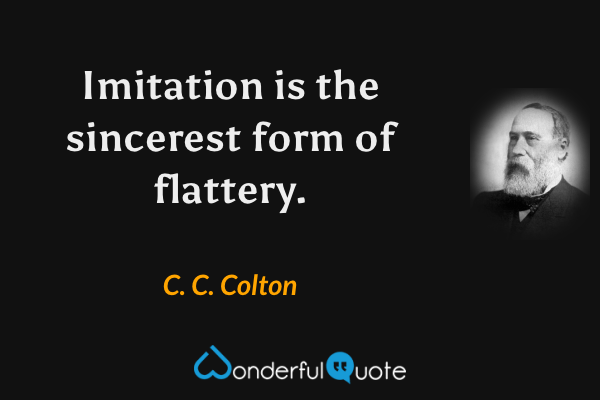
Imitation is the sincerest form of flattery.

Where we cannot invent, we may as least improve.

Moderation is the inseparable companion of wisdom.

The masses procure their opinions ready made in open market.
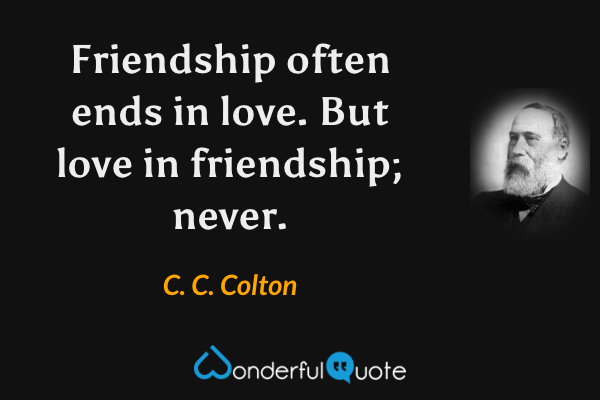
Friendship often ends in love. But love in friendship; never.

Silence is foolish if we are wise, but wise if we are foolish.

Applause is the spur of noble minds, the end and aim of weak ones.

The present time has one advantage over every other — it is our own.
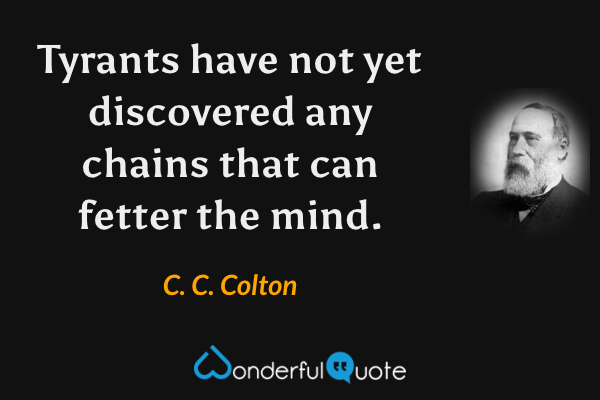
Tyrants have not yet discovered any chains that can fetter the mind.

None are so fond of secrets as those who do not intend to keep them.

Pride makes some men ridiculous but prevents others from becoming so.
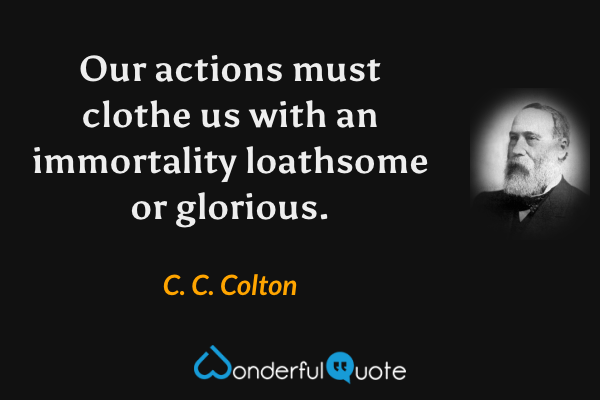
Our actions must clothe us with an immortality loathsome or glorious.
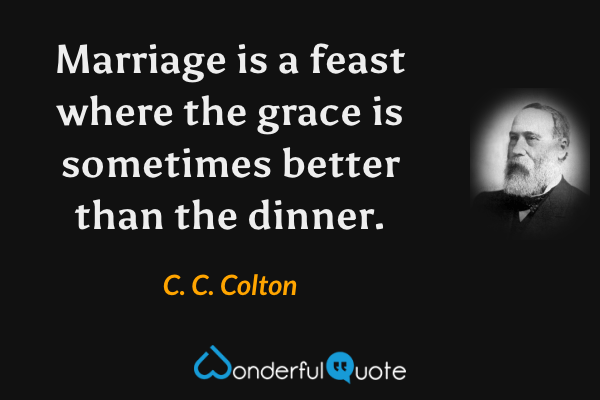
Marriage is a feast where the grace is sometimes better than the dinner.

Did universal charity prevail, earth would be a heaven, and hell a fable.

Independence of principle consists in having no principle on which to depend.
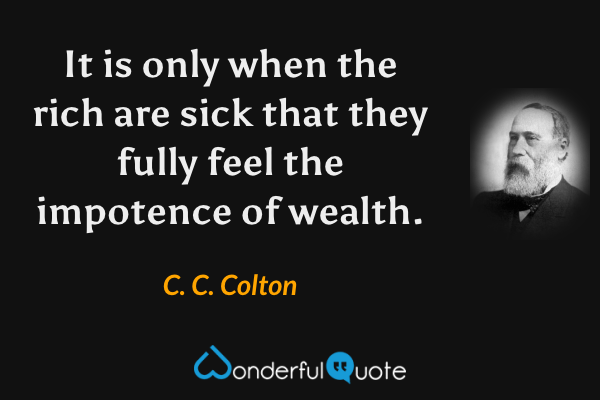
It is only when the rich are sick that they fully feel the impotence of wealth.

Success seems to be that which forms the distinction between confidence and conceit.

He that has never known adversity is but half acquainted with others, or with himself.

The whole family of pride and ignorance are incestuous, and mutually beget each other.
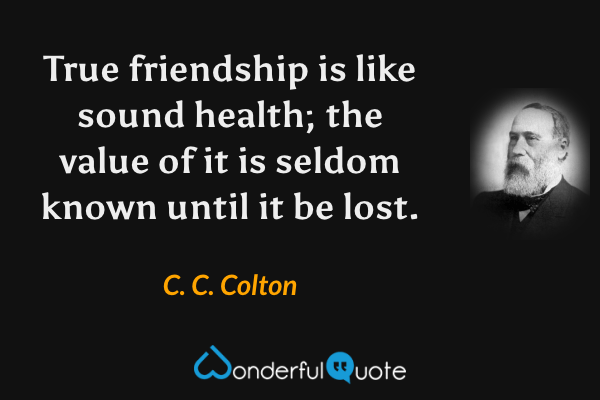
True friendship is like sound health; the value of it is seldom known until it be lost.

Criticism is like champagne, nothing more execrable if bad, nothing more excellent if good.

It is an easy and vulgar thing to please the mob, and no very arduous task to astonish them.
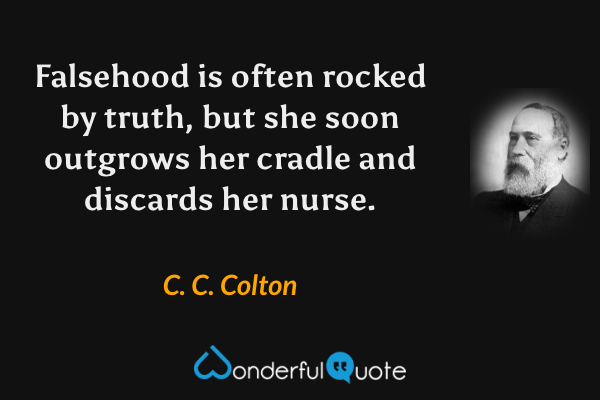
Falsehood is often rocked by truth, but she soon outgrows her cradle and discards her nurse.

Doubt is the vestibule which all must pass, before they can enter into the temple of wisdom.

There are some frauds so well conducted that it would be stupidity not to be deceived by them.

A wise man may be duped as well as a fool; but the fool publishes the triumph of the deceiver.
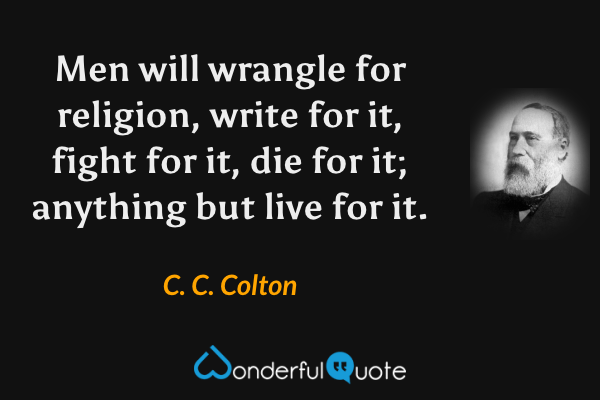
Men will wrangle for religion, write for it, fight for it, die for it; anything but live for it.
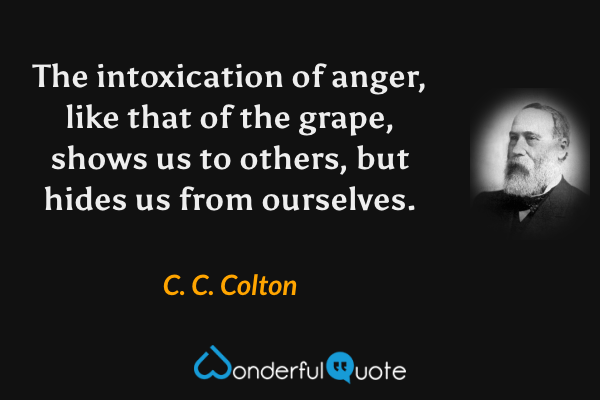
The intoxication of anger, like that of the grape, shows us to others, but hides us from ourselves.

Doubt is the vestibule through which all must pass before they can enter into the temple of wisdom.
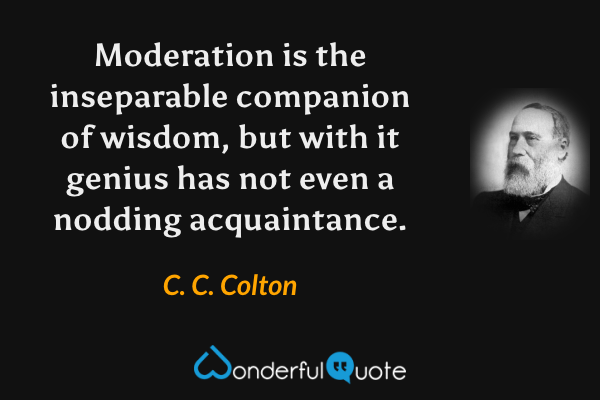
Moderation is the inseparable companion of wisdom, but with it genius has not even a nodding acquaintance.
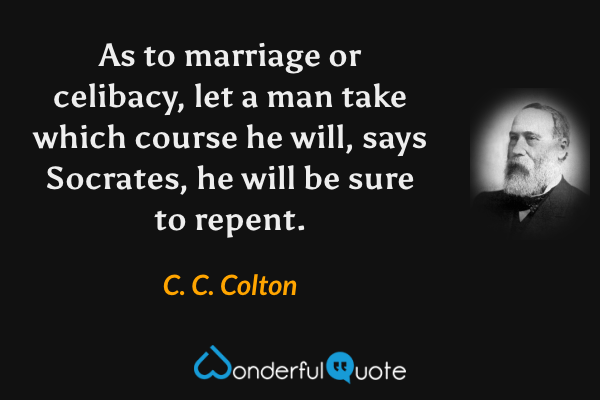
As to marriage or celibacy, let a man take which course he will, says Socrates, he will be sure to repent.

The excesses of our youth are drafts upon our old age, payable with interest, about thirty years after date.

We are more apt to catch the vices of others than their virtues, as disease is far more contagious than health.
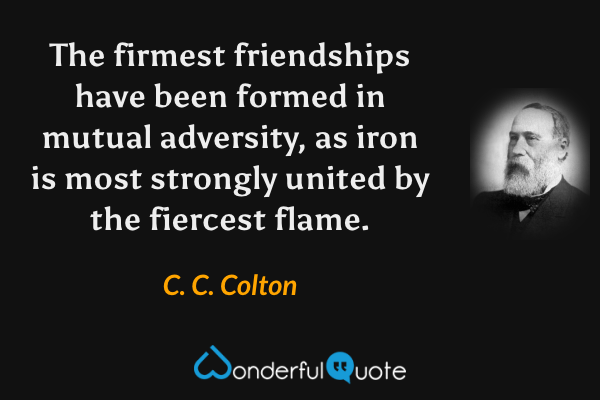
The firmest friendships have been formed in mutual adversity, as iron is most strongly united by the fiercest flame.
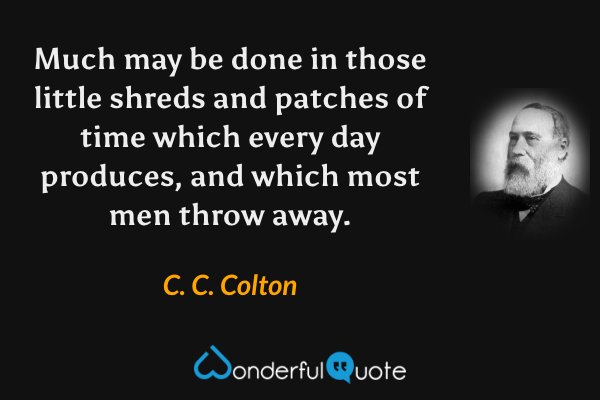
Much may be done in those little shreds and patches of time which every day produces, and which most men throw away.

Logic and metaphysics make use of more tools than all the rest of the sciences put together, and they do the least work.

To know the pains of power, we must go to those who have it; to know its pleasure, we must go to those who are seeking it.

Posthumous charities are the very essence of selfishness when bequeathed by those who, when alive, would part with nothing.

The man of pleasure, by a vain attempt to be more happy than any other man can be, is often more miserable than most men are.
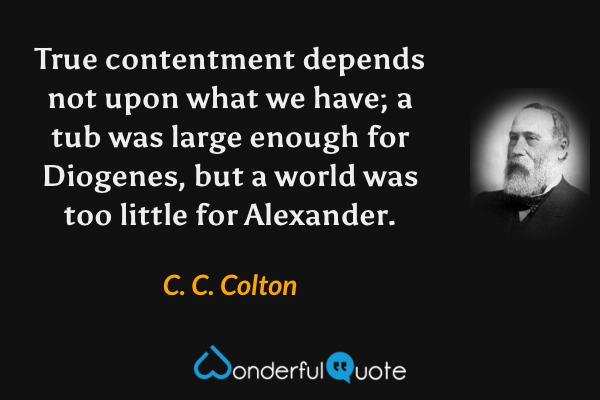
True contentment depends not upon what we have; a tub was large enough for Diogenes, but a world was too little for Alexander.
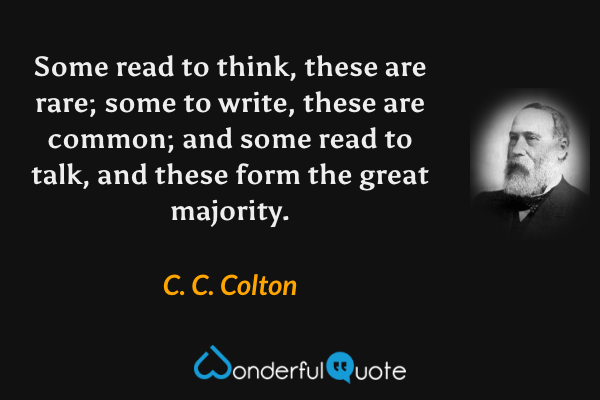
Some read to think, these are rare; some to write, these are common; and some read to talk, and these form the great majority.

We are sure to be losers when we quarrel with ourselves; it is a civil war, and in all such contentions, triumphs are defeats.

If you cannot inspire a woman with love of you, fill her above the brim with love of herself—all that runs over will be yours.

Those who have finished by making all others think with them, have usually been those who began by daring to think for themselves.

Nothing so completely baffles one who is full of trick and duplicity himself than straightforward and simple integrity in another.

As no roads are so rough as those that have just been mended, so no sinners are so intolerant as those that have just turned saints.

Were we as eloquent as angels, yet should we please some men, some women, and some children, much more by listening, than by talking.

A man that never knows adversity is but half acquainted with others, or with himself. Constant success shows us but one side of the world.

A man that will not permit his wealth to do any good to others while he is living prevents it from doing any good to himself when he is dead.
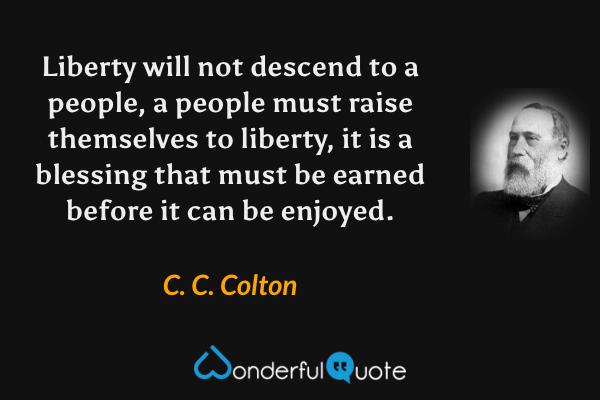
Liberty will not descend to a people, a people must raise themselves to liberty, it is a blessing that must be earned before it can be enjoyed.

Some indeed there are who profess to despise all flattery, but even these are nevertheless to be flattered, by being told that they do despise it.

The science of legislation is like that of medicine in one respect: that it is far more easy to point out what will do harm than what will do good.

Conversation is the music of the mind, an intellectual orchestra, where all the instruments should bear a part, but where none should play together.

There are three difficulties in authorship: to write anything worth publishing, to find honest men to publish it, and to find sensible men to read it.

When we feel a strong desire to thrust our advice upon others, it is usually because we suspect their weakness ; but we ought rather to suspect our own.

Envy, if surrounded on all sides by the brightness of another's prosperity, like the scorpion confined within a circle of fire, will sting itself to death.

Happiness, that grand mistress of the ceremonies in the dance of life, impels us through all its mazes and meanderings, but leads none of us by the same route.

Analogy, although it is not infallible, is yet that telescope of the mind by which it is marvellously assisted in the discovery of both physical and moral truth.

The true motives of our actions, like the real pipes of an organ, are usually concealed. But the gilded and the hollow pretext is pompously placed in the front of show.
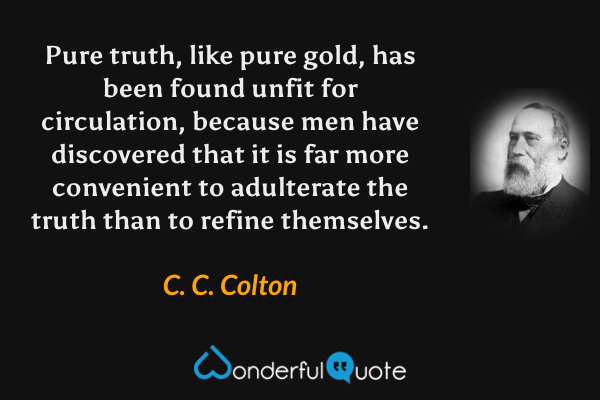
Pure truth, like pure gold, has been found unfit for circulation, because men have discovered that it is far more convenient to adulterate the truth than to refine themselves.

We injure mysteries, which are matters of faith, by any attempt at explanation, in order to make them matters of reason. Could they be explained, they would cease to be mysteries.

A harmless hilarity and a buoyant cheerfulness are not infrequent concomitants of genius; and we are never more deceived than when we mistake gravity for greatness, solemnity for science, and pomposity for erudition.

The society of dead authors has this advantage over that of the living; they never flatter us to our faces, nor slander us behind our backs, nor intrude upon our privacy, nor quit their shelves until we take them down.

Time is the most undefinable yet paradoxical of things; the past is gone, the future has not come, and the present becomes the past even while we attempt to define it, and, like the flash of the lightning, at once exists and expires.
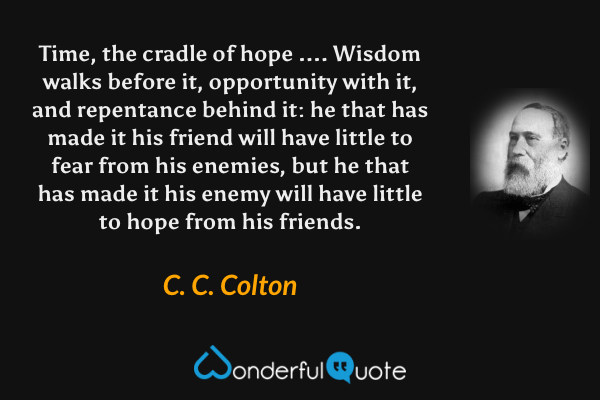
Time, the cradle of hope .... Wisdom walks before it, opportunity with it, and repentance behind it: he that has made it his friend will have little to fear from his enemies, but he that has made it his enemy will have little to hope from his friends.
Friendship often ends in love; but love in friendship - never.
Friendship often ends in love; but love in friendship — never.
None are so fond of secrets as those who do not mean to keep them.
True friendship is like sound health; the value of it is seldom known until it is lost.
Men will wrangle for religion; write for it; fight for it; die for it; anything but live for it.
When we feel a strong desire to thrust our advice upon others, it is usually because we suspect their weakness; but we ought rather to suspect our own.
Time is the most undefinable yet paradoxical of things; the past is gone, the future is not come, and the present becomes the past even while we attempt to define it, and, like the flash of lightning, at once exists and expires.


